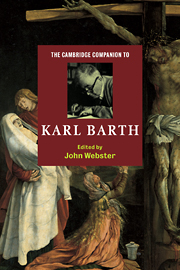Book contents
- Frontmatter
- 1 Introducing Barth
- 2 Theology
- 3 Revelation
- 4 The Bible
- 5 The Trinity
- 6 Grace and being
- 7 Creation and providence
- 8 Karl Barth’s Christology
- 9 Salvation
- 10 The humanity of the human person in Karl Barth’s anthropology
- 11 The mediator of communion
- 12 Christian community, baptism, and Lord’s Supper
- 13 Barth’s trinitarian ethic
- 14 Karl Barth and politics
- 15 Religion and the religions
- 16 Barth and feminism
- 17 Barth, modernity, and postmodernity
- 18 Karl Barth
- Index
1 - Introducing Barth
Published online by Cambridge University Press: 28 May 2006
- Frontmatter
- 1 Introducing Barth
- 2 Theology
- 3 Revelation
- 4 The Bible
- 5 The Trinity
- 6 Grace and being
- 7 Creation and providence
- 8 Karl Barth’s Christology
- 9 Salvation
- 10 The humanity of the human person in Karl Barth’s anthropology
- 11 The mediator of communion
- 12 Christian community, baptism, and Lord’s Supper
- 13 Barth’s trinitarian ethic
- 14 Karl Barth and politics
- 15 Religion and the religions
- 16 Barth and feminism
- 17 Barth, modernity, and postmodernity
- 18 Karl Barth
- Index
Summary
'As a theologian one can never be great, but at best one remains small in one's own way': so Barth at his eightieth birthday celebrations, characteristically attempting to distance himself from his own reputation. Nonetheless, Barth is the most important Protestant theologian since Schleiermacher, and the extraordinary descriptive depth of his depiction of the Christian faith puts him in the company of a handful of thinkers in the classical Christian tradition. Yet firsthand, well-informed engagement with Barth's work remains - with some notable recent exceptions - quite rare in English-speaking theological culture. His magnum opus, the unfinished thirteen volumes of the Church Dogmatics, is not always studied with the necessary breadth and depth, and his theological commitments are still sometimes misconstrued or sloganized. The significance of Barth's work in his chosen sphere is comparable to that of, say, Wittgenstein, Heidegger, Freud, Weber, or Saussure in theirs, in that he decisively reorganized an entire discipline. Yet Barth's contribution to Christian theology is in many respects still only now beginning to be received.
- Type
- Chapter
- Information
- The Cambridge Companion to Karl Barth , pp. 1 - 16Publisher: Cambridge University PressPrint publication year: 2000
- 5
- Cited by

